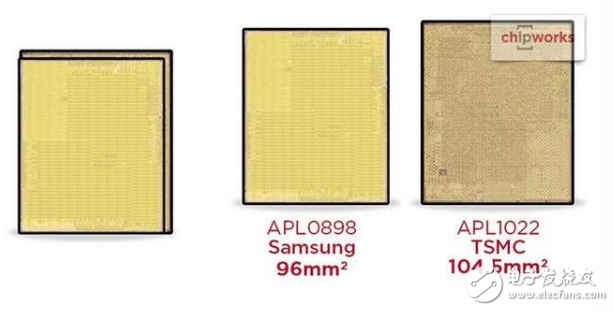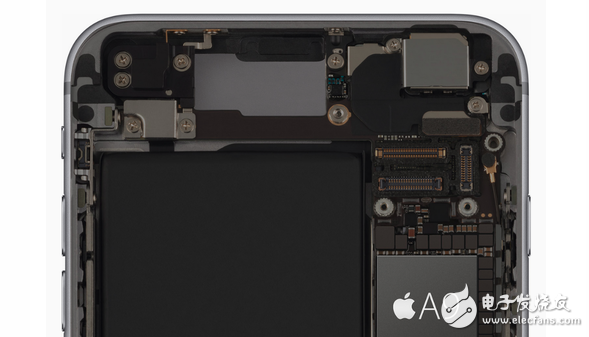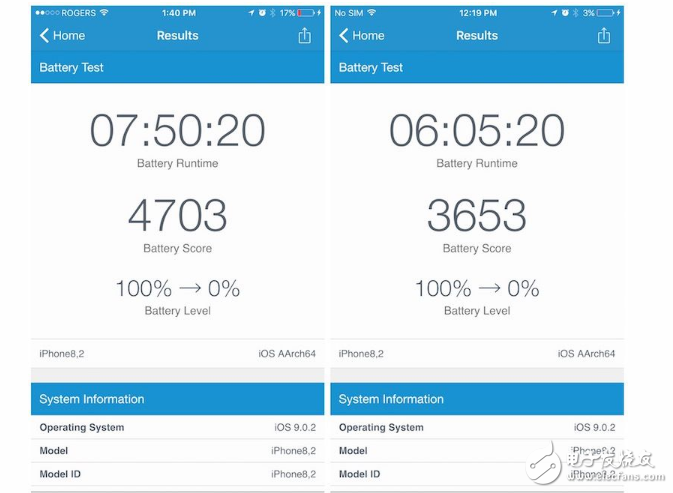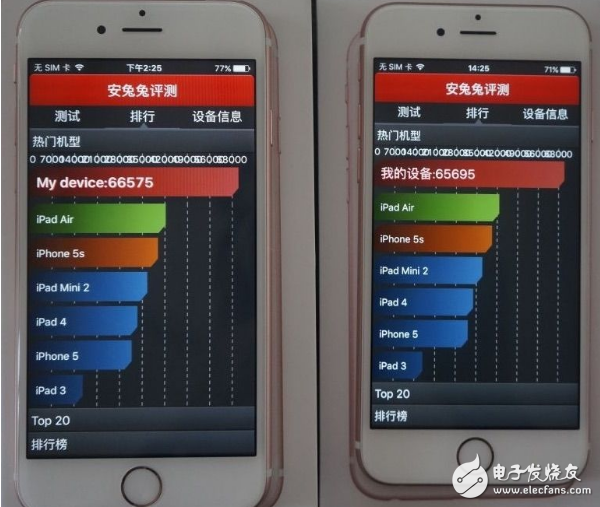Taiwan Semiconductor Manufacturing Co., Ltd., referred to as TSMC and TSMC, is a Taiwanese semiconductor manufacturing company. Founded in 1987, it is the world's first and largest professional integrated circuit manufacturing service (foundry) company. The main factory is located in the Hsinchu Science Park. In 2013, the revenue was 1.985 billion US dollars, and the foundry market share was 46%, ranking first in the world. In 2011, the capital amounted to approximately NT$259.15 billion and the market capitalization was approximately US$100 billion. It is the largest listed company in Taiwan. TSMC's total production capacity has reached 4.3 million wafers throughout the year, and its revenue accounts for about 60% of the global foundry market. As we all know, Apple used the latest A9 chip in the iPhone 6s and iPhone 6s Plus released recently. Considering the unit cost and yield factor of the parts, Apple decided to hand over the OEM work of the chip to Samsung and TSMC. The shipment ratio of the two foundries is about 6:4. However, some foreign users and media tested the A9 chips of these two manufacturers and found that although the 14nm process used by Samsung's A9 chip is superior to TSMC's 16nm process in terms of process, Samsung's production is in terms of actual endurance. The A9 is obviously inferior to the A9 chip produced by TSMC. For this conclusion, Apple gave an official response last week: "Our test and user actual usage data shows the actual battery life of the iPhone 6s and iPhone 6s Plus even after taking into account the difference in parts. The difference is only about 2-3%." At the same time, the test results of the well-known technology website Ars Technica also showed that the iPhone 6s using the TSMC A9 chip performed slightly better in the Wifi browsing and GFXBench tests, but the score in the WebGL test was not as good as the Samsung A9 chip. iPhone 6s. It is reported that the test models used by Ars Technica are AT&T contract machines without SIM card installed. Moreover, in order to pursue the most accurate test data, Ars Technica also adjusted both screens to the same brightness before testing. Previously, the battery life test results conducted by the media using Geekbench 3 showed that the iPhone 6s with the TSMC A9 processor lasted nearly two hours longer than the Samsung version of the A9 processor under the same settings and usage. At the same time, the iPhone 6s of TSMC's A9 chip has a clear advantage in the Geekbench 3 benchmark, with a score of 28 percentage points higher than the Samsung version. For this evaluation, Apple complained that the test environment of the media was "unrealistic." “The lab test environment set by some manufacturers is a bit too aggressive, because they usually test when the device CPU is fully loaded until the battery is completely exhausted, and this test method will allow us to use the device in actual use environment. The endurance ability under the misunderstanding." Ars Technica said in the final conclusion that the iPhone 6s with different A9 chip versions will only show a slight performance difference in some extreme cases (especially when the CPU is fully loaded). In the A9 chip of the iPhone 6s, Apple also used Samsung and TSMC's foundry chips. Among them, the TSMC foundry chip uses a 16-nanometer process, while the Samsung OEM A9 chip uses a 14-nanometer process. So, what is the difference between the 14nm process and the 16nm process? What impact do they have on the user experience? Technical difference In the A9 chip of the iPhone 6s this year, Apple also used Samsung and TSMC's foundry chips. Among them, the TSMC foundry chip uses a 16-nanometer process, while the Samsung OEM A9 chip uses a 14-nanometer process. So, what is the difference between the two numbers of 14nm process and 16nm process? The nanometer process is a manufacturing process that refers to the minimum line width of the transistor gate. Taking 14 nm as an example, the process means that the line width can be as small as 14 nm in the chip. The smaller the minimum line width, the smaller the minimum size of the transistor, and the smaller the chip area is designed. The main purpose of reducing the transistor is to reduce the power consumption, and the transistor can be reduced to insert more chips into the smaller chip. The transistor allows the chip to not become larger due to technological advancement; secondly, it can be downsized without degrading performance (speed, power consumption), and the same amount of money can create more transistors with new technology. The increase in transistors can increase the computational efficiency of the processor, which means higher computing power. Moreover, reducing the volume can also reduce the power consumption; finally, after the chip is reduced in size, it is easier to integrate into mobile devices (such as mobile phones), and the device can be made thinner and lighter. Reverse engineering technology company Chipworks researched the chips of iPhone 6s. They produced the A9 processor of APL0898 for Samsung. The manufacturing process is 14nm FinFET with a total chip area of ​​96 square millimeters. The processor code-named APL1022 is produced by TSMC. The process is a 16nm FinFET with a total chip area of ​​104.5 square millimeters. The processor produced by Samsung is 10% smaller than TSMC. Under normal circumstances, the more advanced the process, the higher the chip performance ratio, so the Samsung chip power consumption may be lower than the TSMC version. Fever test As mentioned above, in theory, Samsung's 14nm process has mature Apple A-system processor OEM experience; while TSMC uses 16nm, and it is the first time, so Samsung's version will have more advantages. However, the net results of netizens are exactly the opposite. Some netizens have produced a video that details the differences between Samsung and TSMC's two versions of the A9 processor. In the first phase of the Geekbench test, the Samsung version of the device gradually became hot. As the test progressed, the score changed slightly from the beginning to the TSMC. Significant declines in performance many times. The test found that the temperature of the Samsung version reached 40 degrees, about 5 degrees higher than that of TSMC. In contrast, TSMC's performance is relatively stable, there is no obvious fluctuations, and the temperature is not as high as 36 degrees. The second phase of the test used Ann Bunny, and the Samsung version continued to heat up, but TSMC did not. The temperature difference is around 5 degrees. During the test, Samsung experienced a flashback. It should be noted that each time TSMC runs the test and wins the score. Because the version of Samsung is very hot, whether it is the screen border or the back of the fuselage, there is a hot feeling, so the stress test only lasted for ten minutes, and finally had to stop. The netizen said that from the beginning to test the actual capacity of the battery, and then compare the capacity after the end of the run, the result made him stunned. The iPhone 6s Plus using TSMC's 16nm processor, although the screen is larger, only consumes 314 mA. Electricity. In contrast, the iPhone 6s using the Samsung 14nm processor actually consumes 70 mA more than the iPhone 6s Plus, reaching 384 mA. Battery life impact In terms of battery life, Samsung and TSMC's A9 chips will have different effects. The picture shows a reddit user's battery life compared to the iPhone 6s Plus using Samsung and TSMC chips. In the Geekbench 3 test, it was found that the TSMC version had a battery life of about two hours longer than the Samsung version. The tester conducted multiple tests, and the two devices were tested under the same conditions, and the results obtained were basically the same. As a developer of Geekbench, Prima Labs' John Poole explains the difference between the two in battery life. He pointed out that there was news that TSMC's 16-nanometer process is superior to Samsung's 14-nanometer process in terms of energy consumption. However, when the performance scores of various components are basically the same, battery life will be so different. He is also a bit surprised. In addition, in the test of the running test of Ann Bunny, the results also show that the TSMC version of the battery life will be a little longer than the Samsung version. On the left is the TSMC iPhone 6s, and on the right is the Samsung iPhone 6s. The former has 77% of remaining power and the latter is 71%. However, although the test has proved that the TSMC A9 is slightly better than the Samsung version of the A9 in terms of power efficiency, but what is the actual use, we have not yet reached a conclusion. Recently, some users have evaluated the two versions of the chip according to their tests and daily use, but there are also many different opinions. I believe there will be many similar tests next, but the best test should be daily use. If you want to know if your iPhone 6s running A9 chips from TSMC or Samsung, you can try using the Lirum Device Info Lite app, which will use Samsung or TSMC chips in the Model InformaTIon display device (iPhone 6s Plus for Samsung) / TSMC chips are N66AP / N66mAP, and Samsung 6/SMC chips for iPhone 6s are N71AP/N71mAP respectively. I don't know if you have verified whether the iPhone 6s or iPhone 6s Plus you purchased is using Samsung or TSMC chips? Have you compared the impact of the A9 chips from the two foundries on the equipment?
Laptop power adapter charger for Macbook, Macbook Air and Macbook Pro.
45w, 60w, 80w charger with Magsafe 1 or Magsafe 2 connector.
Four replacement ac plugs for your choices, US / EU / UK / AU plug as your requirement.
Stable output and high charging efficiency.
Elegant outlook design as original one, touch smoothly and comfortable.
Easy carry if you want to take your computer outside for business or travel.
Original charger is good, but as a replacement, our product has more reasonable price when your original charger is broken.
And, the market of the replacement adapters becomes bigger and bigger. People would rather buy a copy one then the original because of the price.
But at the same time, people worry about that they will buy something defective. So the problem comes, how to buy a good quality one with a good price?
As a professional power adapter manufacturer, we have excellent R&D team, skilled staffs and responsible after-sale service. All your benefits can be under protected after you buy products for our company.
Our certificates :ISO9001:2008 & ISO14001:2004 , CCC , CE , FCC , ROHS.
All our products has 1 year warranty. In other words, if you get the dad products which are not damaged physically from us in one year, we will replace you the new one or the whole bulk order.
Macbook Adapter,45W Adapter For Macbook,45W Charger For Macbook,60W Charger For Macbook,Macbook Charger Shenzhen Waweis Technology Co., Ltd. , https://www.huaweishiadapter.com


